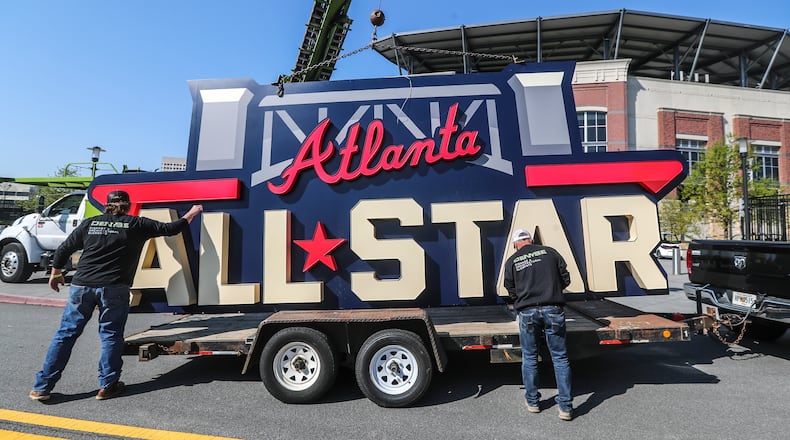When Cobb County saw a chance in 2013 to woo the Braves from downtown Atlanta to a plot of land just outside the Perimeter, Commission Chairman Tim Lee sprang into action.
A three-hour lunch leading Braves executives through the team’s options in Cobb eventually led to the gleaming $1.1 billion ballpark and Battery development, including $300 million from Cobb taxpayers.
The Braves moved to Cobb, the ballpark was built and premier events started rolling in — until April 2, when Major League Baseball announced it would move this summer’s All-Star game after Gov. Brian Kemp signed Senate Bill 202, the state’s new election law.
Along with the game, the county estimates it will lose up to $100 million of economic impact.
Whether that number is exaggerated or not, it’s clear that Georgia’s leaders are learning that life isn’t like that “Field of Dreams” promise, “If you build it, they will come.”
Even if you build a gleaming stadium in a diverse, vibrant community, Major League Baseball isn’t going to stick around for your no-water-at-the-polls PR disaster.
And Coca-Cola, the beloved hometown beverage maker that helped fuel Atlanta’s rise, will leave you out to dry when a state-level piece of legislation results in a potential boycott of its own brand around the world.
That’s essentially what happened after GOP leaders negotiated the details of the bill with some of Georgia’s biggest corporate titans, only for Coca-Cola’s London-based CEO, James Quincey, to torch the new law on CNBC as “unacceptable” and “a step backward.”
“This is wrong and it needs to change,” Quincey said.
But there’s no easy way to unwind a bill that’s already passed, especially when the General Assembly isn’t scheduled to meet in a full session of lawmaking again until 2022.
The question now is what happens next in the state that the governor touts as “No. 1 for Business” but is also on the outs with the some of the biggest businesses in the world with no easy fix at hand.
“I don’t think you’ll hear anybody on our side say that we don’t greatly respect them and the role they play, that we don’t welcome their feedback and input,” Bert Brantley, Kemp’s deputy chief of staff, told The Atlanta Journal-Constitution’s Tamar Hallerman.
“I do think there’s some frustration out there because the process worked as it has so many times before and then we were blindsided,” Brantley said. “You had CEOs or whoever just completely turn their backs on all that work that was done at the Capitol after months of discussions.”
What comes next is anyone’s guess. And plenty of people are guessing.
Will other events pull out of Georgia? More importantly, will businesses looking for their next headquarters or regional hub bypass Georgia entirely to skip the controversy?
And will Georgia lawmakers be willing to negotiate with businesses if they think Delta Air Lines and Coca-Cola can’t be trusted?
A top Republican told me: “It’s like someone flipped a switch and we can’t unflip it. I don’t know how it gets better.”
State Sen. Jen Jordan, D-Sandy Springs, represents a business-friendly swath of Cobb and Fulton counties that includes Truist Park.
“It’s a little chilling to see how Republicans have been treating some of our largest corporate citizens,” she said.
“The message that they’re sending to business, either here in the state or businesses they’re looking to bring to the state is, we’re the No. 1 state to do business as long as you agree with what we say and what we do.”
The usually cozy relationship between the state of Georgia and the businesses here has always rested somewhere between mutually beneficial and downright co-dependent.
The upside for the state has been the tax revenue, population boost and prestige that all come with having corporations call Georgia home (Take that, Alabama!).
In return, businesses get cheap houses for their executives, good schools for their employees’ kids and, frequently, loads of incentives from the state and local governments to put down and keep local roots.
The $300 million from Cobb County is a great example. So is the jet-fuel tax break that the state House voted to ax (but the state Senate left untouched) after Delta slammed SB 202.
The latest goodie was tucked into the state’s 2022 budget, when MARTA got its first-ever line-item expenditure, in this case, to upgrade the Bankhead rail station.
While lawmakers have been loath to create a funding stream for Atlanta mass transit, improving the Bankhead station was a part of the package for Microsoft’s new campus coming to Atlanta’s Quarry Yards development.
Like Jordan, Rep. Teri Anulewicz, D-Smyrna, represents the portion of Cobb that includes Truist Park.
She noted that it’s not the first time Cobb County has lost out on a major sporting event because of politics.
In 1996, the Olympic torch relay avoided Cobb entirely after the then-Board of Commissioners refused to repeal its 1993 resolution condemning the ″lifestyles advocated by the gay community.″
“That was the Cobb County of the 20th century,” Anulewicz said. “The Cobb County of the 21st century has become this dynamic and diverse hub for businesses and families and baseball.”
But being the Cobb County of the 21st century wasn’t enough to keep the All-Star game in Georgia when a very Georgia controversy exploded.
It turns out being No. 1 for Business in a global economy also requires maintaining a predicable, low-profile political environment, too.
And that might be the one promise Georgia can’t make.
About the Author
Keep Reading
The Latest
Featured


